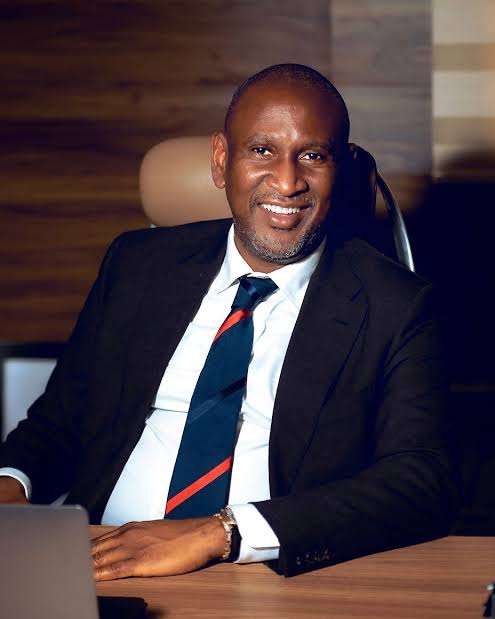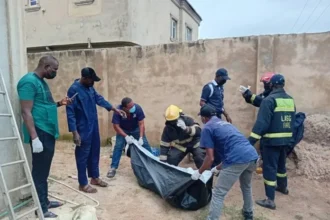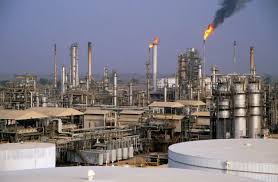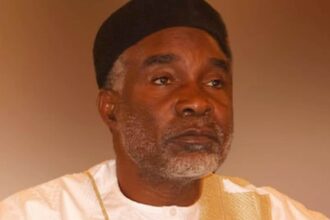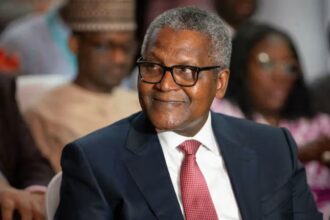...To get all news updates, Join our WhatsApp Group (Click Here)
Also Join our WhatsApp Channel (Click Here)
By Obiora Onyeaso
Dr. Akintoye Akindele, Founder/CEO of Duport Midstream Company Ltd., shows Governor Godwin Obaseki of Edo State, the host state, around Duport Energy Park in October 2022
A new front has opened in the battle for control of Duport Midstream Company Limited, owner of the eponymous energy park located in Edo State.
Fresh hostilities were triggered by a backdoor appointment of a receiver in the person of Mrs. Oghogho Makinde.
Her spurious appointment was orchestrated by a minority rump of Duport Midstream’s board led by its former Chairman, Mrs. Mobolaji Kuku, and Norsad Capital, a Botswana-based lender. You cannot make this thriller up.
The high stakes war for governance dominance between two factions on the board has raged on for months with no sign of a ceasefire anytime soon.
On one side is Dr. Akintoye Akindele, Founder/CEO of the company. Akindele was the company’s fundraiser-in-chief from its conception to ribbon-cutting. It will not be an exaggeration to characterize him as the key man of the company.
The Corporate Finance Institute website defines a key man as “an important employee or executive who is critical to the operation of the business, and whose death, absence, or disability may have a significant negative effect on the operation of a company. Key people possess skills, knowledge, leadership abilities, and experience that are considered crucially important for the continued success of the business.”
Among the company’s directors, he committed the most resources through his wide network in the public and private sectors as well as financially, to the take-off of the company.
Akindele tapped his vast reseau of contacts in government to facilitate passage through the thicket of bureaucratic red tape involved in the take-off and operation of a refinery.
His vision is that the Duport Energy Park will be the first in a series of world-class refining facilities across Nigeria promoted by Platform Capital Investment Partners, an investment firm he founded.
Platform Capital is the majority shareholder in Duport Midstream Company. The firm controls 74 per cent of shares in the company.
On the opposite bench are directors nominated by a group of minority shareholders intent on seizing control of the company by book or by crook.
So far, their complots have been rejected as null and void when passed through the furnace of the courts.
Asides the two factions, there is a neutral bloc of directors who have refused to align with either side. Rather, they insist that the two sides abide by global best practices in corporate governance.
The neutral directors, Professor Oluwatoyin Ogundipe, Mr. Cherif Abdallah, Mr. Adeola Idowu and a representative of the Nigerian Content Development and Management Board (NCDMB) have been beacons of propriety in a sea of fitful tempers.
As representatives of shareholder interest, they have always put the long-term interest of the company above selfish alliances. NCDMB under Engr. Simbi Wabote, its Executive Secretary, has made the take-off of modular refineries a cornerstone of its strategy. Ogundipe is a former vice chancellor of the University of Lagos (2017-2022). He currently serves as chairman of Lagos State Science Research and Innovation Council.
The latest hostilities blew up after Oghogho Makinde announced that she had removed Akindele, Ogundipe and Abdallah “with immediate effect”.
In the same communication, she stated that she had appointed new directors to the board in the persons of Ms. Seyi Willoughby, Ms. Adetola Adegbayi and Mr. Ayo Fakolade.
First, the process of removal and appointment of directors by a letter with “immediate effect” is clownish. It flies in the face of the provisions of the articles of Duport Midstream Company Limited and Companies and Allied Matters Act 2020 (“CAMA”) for the appointment and/or removal of directors.
The appointment and/or removal of directors would usually entail a notice of a general meeting, and the passing of a resolution at such a meeting.
None of these were done by Makinde.
Besides, where does a receiver derive powers to remove directors?
Pray tell, from whence does a receiver derive the powers to interfere in management beyond the disposal of assets to recover debts?
Did she take any prior steps to engage the management of Platform Capital on the repayment before this episode of adventurism?
Moreover, the validity of Makinde’s appointment as a receiver over the assets of Platform Capital, is currently being challenged in Suit No: FHC/L/CS/1984/2023; Norsad Capital Limited & 2 Ors. -v- Platform Capital (PTY) Limited & 11 Ors. pending before the Federal High Court, Lagos.
It is worth noting that not a single one of the nominated directors of Oghogho Makinde possesses a shard of operational experience in the midstream sector.
Among the duppy appointees, Willoughby’s name caught my eye.
From June to October in 2022, she was the Head of Strategy and Advisory at Platform Capital. Concurrently, she served as the Chief Strategy Officer of Iman Africa Energy Group, a Special Purpose Vehicle (SPV).
An SPV is a legal entity set up for a given purpose, usually the purchase and management of a specific asset.
Iman Africa and Adamantine Energy are the operating and management entities for Platform Capital investment in the energy industry which includes Duport Midstream Company Limited.
During Willoughby’s time at Duport Midstream Company/ Iman Africa she was intimately involved in meetings, negotiations, communications pertaining to Adamantine Energy’s investments in the energy sector.
The investment portfolio includes a significant stake in the prodigious Ekpat Marginal Field located within PPL 231, offshore Eastern part of Niger Delta basin.
Geological studies estimate that the bloc contains enviable hydrocarbon reserves. Adding that to the kitty is the stuff that corporate raider wet dreams are made of.
Is it impossible that it was precisely this professional experience on her résumé that made her an attractive Trojan horse and not the years she spent at GTBank, where from January 2016 to March 2022 she had responsibility for the commercial bank’s Midstream Oil and Gas portfolio?
In situations like these one is inclined to run a query on what confidential information she gained access to in the course of her time at the Duport Midstream Company/ Iman Africa which would serve mal-intentioned parties?
Would it be considered paranoia to imagine that this information might have been passed on to others outside the course of her job at the investment firm?
I will leave you to decide.
Adegbayi is an executive director at Leadway Assurance, one of Nigeria’s biggest composite insurance underwriters. Her appointment also presents an interesting conjecture.
Would a roaming mind be penalised for thinking that the financial firepower of a major insurance company desirous of gaining a foothold as a significant shareholder in Duport was not a factor in picking her?
Fakolade is the principal partner at Compleo, one of countless sub-sub-tier law firms in Nigeria straining to make their bones in a specialty area or two.
He got his start in legal practice at Aluko & Oyebode in 2003, the same year Makinde was minted a partner of the firm.
What is the moral of the story?
Given time the real puppet masters pushing this slate of mock directors to the board of Duport Midstream drama will be revealed.
Despite clear rules in Companies and Allied Matters Act 2020 (CAMA) that reserve the exclusive right for removal and appointment of directors for shareholders during an annual general meeting (AGM), Makinde and her backers decided in their wisdom to usurp same.
Elsewhere, Makinde mentioned that the decision to exclude Akindele from a board meeting held on 15 November was reached because of by virtue of his “indictment on criminal charges by a Federal High Court earlier in the year” as stipulated by the company’s Shareholders Agreement.
Unless she is referring to a secret Shareholders Agreement separate from the one in possession of the Company Secretary, Makinde would do well to make public the specific clause in the document where an indictment, by and of itself, is sufficient basis to exclude a director from board meetings.
It would appear that Makinde is conflating three words with different meanings: arraignment, indictment, and conviction.
For the sake of clarity an indictment is not a conviction.
An indictment is simply “the filing of an information against a person in the High Court.”
An arraignment is “the first step in a criminal proceeding when a defendant appears in court to enter a plea of either guilty or not guilty, and argue for bail.”
The quantum of mischief conjured to use charges listed on a sheet of paper or an appearance in court as a pseudo-basis for the defamation of character speaks volumes about the ignorance of the person seeking to exploit public naïveté.
Akindele was never convicted by any court early this year nor at any time whatsoever.
He was detained illegally on the orders of a magistrate in Nasarawa State.
The order in Suit no. CMC/MG/CR/17S/2023 was later vacated by the same Chief Magistrate Court in Nasarawa State, sitting at Mararara Gurku, when it was presented with fresh facts and its attention drawn that it had acted in a matter outside its jurisdiction.
In another case, Suit no. CR/595/2023, brought by then Acting Inspector General of Police Kayode Egbetokun as the Plaintiff/Applicant, Akindele was said to have offered “gratification of N150,000,000.00 and made part payment of N50,000,000.00 to SP Ibrahim Sini, a public servant in circumstance and to allow you to escape abroad and to write a report in your favour.”
This case, brought before Justice Hamza Muazu of the Federal Capital Territory High Court sitting in Maitama, will in due course be proven by Akindele’s lawyers to be one of deceitful entrapment, wilful manipulation, and oppressive duress to implicate an individual who had spent weeks in illegal detention.
Makinde may have forgotten the basics learned in her 100 Level law courses.
Otherwise, how can she suffer memory loss that “a fundamental principle behind the right to a fair trial is that every person is presumed innocent unless and until proven guilty”?
This principle is enshrined under Article 11 of the Universal Declaration of Human Rights that states that “Everyone charged with a penal offence has the right to be presumed innocent until proved guilty according to law in a public trial at which he has had all the guarantees necessary for his defence.”
The Binis have a saying that you cannot shave a man’s head in his absence.
How can she imply that Akindele was convicted in his absence? When and where did he serve time?
To justify her unilateral action of turning board seats to musical chairs subject to her deejaying whim, Makinde, who is a partner and head of the Business Advisory Practice at Aluko & Oyebode, a Lagos law firm, cited “powers conferred on me under the finance documents, the Companies and Allied Matters Act, 2020 (CAMA), and under all applicable laws.”
The finance documents she was referring to are a Deed of Share Charge and a Composite Security Deed issued by Platform Capital as security to Norsad Capital for a $10 million loan.
She cannot feign ignorance that her fictitious appointment as a receiver over the assets of Platform Capital, and the exercise of any consequent powers have been challenged by plethora of preliminary objections, counter affidavits and counter claims in Suit No: FHC/L/CS/1984/2023; Norsad Capital Limited & 2 Ors. -v- Platform Capital (PTY) Limited & 11 Ors. pending before Hon. Justice Nicholas Oweibo of the Federal High Court sitting in Ikoyi, Lagos.
Her haste points to a dangerous disregard of the court.
For a lawyer called to the Bar thirty-four years ago, precisely in 1989, it is embarrassing to watch her take on the role of a busybody with glee.
The loan from Norsad Capital, which has a 5-year tenure, was extended to Platform Capital Mauritius (PCM). It provided a 2-year grace period on repayment of the principal.
After meeting its repayment obligations in Q1 and Q2 2022, Platform Capitalapproached Norsad Capital to restructure the facility in light of increased funding requirements at Duport Energy Park to meet its commissioning date.
The borrower and lender were unable to agree on terms for the restructuring. In any case, payments resumed in May 2023.
By then, Duport Energy Park had commenced production.
To avoid what was deteriorating into a testy relationship, Platform Capital proposed to fast-tract the loan repayment, inclusive of principal and interest.
After negotiations, general terms for a bullet repayment schedule were agreed in principle by July.
Before Platform Capital could make the first payment based on the revised schedule an unsettling development occurred.
In August, a faction of the board in cahoots with the Nigerian Police obtained an order from a magistrate court in Nasarawa for the illegal arrest of Akindele.
Almost as soon as he was arrested and before it was carried in the media, a senior executive at Norsad rang up a partner at Platform Capital to confirm the veracity of the information.
There is no doubt that a mole had informed him with the intention of provoking panic at the creditor and rubbishing the credibility of Platform Capital. It worked.
In the course of the negotiations one thing became clear to Platform Capital: Norsad Capital was privy to confidential board discussions at Duport Midstream Company Ltd.
This was a betrayal of trust by the leaking agent, who was either on the board or received direct briefing from a board member.
It did not require the sleuth skills of Sherlock Holmes to identify the party with an interest in triggering a loss of faith in Platform Capital and consequent loan default clause that could complicate the status of Platform Capital’s current slate of directors on the board.
All these shenanigans by unseen hands raise a few posers.
1). For the sake of a thought experiment, let’s assume that the appointment of Mrs. Oghogho Makinde followed due process. If she was properly appointed with a mandate to recover the debts owed Norsad Capital by Platform Capital, why has she not gone after other investments in the debtor’s venture capital portfolio that can quickly be liquidated without the stress of regulatory interference.
As everyone knows, the energy sector in Nigeria is regarded by the federal government as having national interest implications. On numerous occasions, the FG has intervened to delay and/or deny transactions of change of ownership even where the willing buyer and willing seller had agreed terms.
If the liquidation of financial obligations was the pure interest of Norsad and its so-called appointed receiver, does it not make sense to have gone after assets that would yield the principal and interest due without much stress?
After all, Platform Capital’s portfolio includes a gold mine of companies with attractive private market valuations such as Koniku, a biotech firm, Koko Networks, a Kenya-based bio-fuel technology enterprise, RxAll, a digital infrastructure platform for healthcare, and Lipa Later, leading fintech platform that offers consumer credit (Buy Now Pay Later), working capital and e-commerce solutions for merchants mainly in Kenya.
2). Norsad Capital makes loud noises about being an impact investing firm with bona fide ESG credentials. The firm makes a hue and cry about ensuring stringent screening and classification, vetting and observance of Social and Environmental Due Diligence (SEDDs) in accordance with the Norsad Social and Environmental Sustainability Handbook and other company policies and guidelines.
If this is true, does its claim to stick to themes around Sustainable Livelihoods, Financial Inclusion, Gender Equality, and Climate and Clean Energy not ring hollow when it jumps into the ring to tussle for control of a fossil fuel company?
Did I miss something?
3). Properly speaking, the legal entity that negotiated the $10 million loan in question from Norsad Capital is Platform Capital Mauritius (PCM). PCM is a totally separate legal entity from Platform Capital Investment Partners that is registered under Nigerian laws at the Corporate Affairs Commission (CAC), Abuja.
It beats the imagination to understand why Norsad Capital, a company registered in Botswana, would avoid seeking redress in Mauritius, a globally recognised investment jurisdiction of repute, where the borrower is registered to pursue recovery in Nigeria.
4). Debt recovery through courts can be a lengthy and expensive process. Borrowers and lenders will generally prefer to exhaust other means to restructure a facility before seeking redress in court. The appointment of a receiver is always a last resort.
Correspondence exists showing that Platform Capital approached Norsad Capital in a sincere attempt to revise the terms for payment without jeopardizing full value due to the lender.
For reasons best known to Norsad Capital, it chose to ignore the offer.
Instead, the firm chose to trash what had until then been a positive business relationship by adopting a combative strategy.
5). How far will the belligerents go to eliminate Akindele from a company he founded, and retains majority control in through Platform Capital?
If past attempts are anything to go by, there is no antic too desperate for them not to try. Akindele must take all necessary precautions.
“What is driving the renegades wrestling to defenestrate Akindele from the board?” one might ask.
Two words: greed and survival.
Duport Energy Park is a cash gusher.
The fully-operational modular refinery situated in Egbokor, Orhionmwon Local Government Area, Edo State has a 2,500-barrels-per-day (bpd) production capacity, a 30-million-standard-cubic-feet (scf) gas processing plant, a 10-million scf compressed natural gas (CNG) plant, 30,000 metric tons refined product terminal, a Tier IV Data Centre, and a 5MW embedded power plant.
Dr. Akindele has never hidden the fact that he would like to reinvest its profits back into the business and other refining ventures. He is playing this for the long-term play.
The other faction has never had it so good.
They demand that the fatted cow be roasted and the harvest seed eaten for dinner.
They demand for a greater slice of the ownership pie to the detriment of Platform Capital, the majority owner, even though they are not prepared to pay for more shares.
It would not be a misrepresentation to say that they are holding Duport Midstream to ransom.
If they cannot have it, they have no qualms getting it killed like the evil woman who went to plead for a baby to be split in two before King Solomon.
Then there is the desperate case of survival.
Duport Energy Park receives feedstock, that is, the crude it refines, from Summit Oil.
Summit Oil, a company founded by Chief MKO Abiola, billionaire businessman and acclaimed winner of the June 12, 1993 election, was the first indigenous company to strike oil in Nigeria.
It was on the scene long, long before the founders of today’s indigenous players such as Seplat Energy, Waltersmith Petroman, Famfa Oil, Nestoil, Oando, Amni International, and Aradel Holdings could tell the difference between expired automotive engine oil and crude oil.
Due to mismanagement, the company fell by the wayside.
A painful truth is that no independent ranking of indigenous upstream companies would rank Summit Oil in the Top 20 today. It is a tale of greatness frittered away.
Due to its proximity to Duport Energy Park, Akindele entered into an agreement with Summit Oil for the supply of condensate to the refinery.
In the normal course of business, a dispute arose over accrued debts for past supplies. To be sure, Duport has never denied its indebtedness to Summit Oil.
To press its demands, Summit Oil cut supply.
As a gesture of good faith, Duport directed its bankers to pay Summit directly from revenue once supply is resumed.
Yet, the company continues to hold out.
This is strange. Does it not want its money back? This is self-sabotage at its most petty.
Might there be a sinister agenda at play here?
If they are planning a pincer movement also known as double envelopment with Summit Oil attacking Duport Midstream on the left flank and Norsad Capital harassing on the right flank, I can disclose for free that the tactic is dead on arrival.
It might interest the reader to know that Mrs. Mobolaji Kuku, the evicted chairman of Duport Midstream Company Ltd., is a daughter of Chief Abiola.
Kuku lost her position after her serial disregard for corporate governance processes including the jettisoning of important clauses in the Shareholders Agreement and usurpation of the role of Company Secretary became unbearable.
It is an unassailable fact that there is a grand design to snatch Duport Energy Midstream Company Ltd. using surreptitious means.
The purported appointment of a receiver shows the extent to which desperation will push some members of the board colluding with Norsad Capital.
Attempts to swindle public opinion through sponsored one-sided stories in the media have woefully failed to gain traction. Likewise, schemes to poison the company’s relationship with commercial banks have fallen flat.
Heaven only knows the next rabbit they will put out of their hat.
John Lyly, an English dramatist, poet, and contemporary of William Shakespeare, wrote that “The rules of fair play do not apply in love and war.” Touché.
Whatever gimmicks they have up their sleeve, all that Platform Capital asks is that proper process be followed.
Nigerians have been entertained enough by these amateurish creeping-monkey-in-snake-shadow kung fu bouts.
Fela the Afrobeat King put it best in his song I.T.T. (International Thief Thief) parodying a famous Nigerian businessman.
This section of the song is as relevant today as it was in 1980 when the song was released.
Like rat they do them go do from
Corner corner, pass-ee pass-ee
Under under, pass-ee pass-ee
Inside inside, pass-ee pass-ee
In in, pass-ee pass-ee
Out out, pass-ee pass-ee
Peep peep, pass-ee pass-ee
Up up, pass-ee pass-ee
It is a tragedy that forty-three years after the song’s release, and twenty-five years after the revered tycoon’s death, the lessons have not sunk into the skulls of those he left behind.
While the antagonists have mindlessly declared a war with limited ammunition, the daggers are drawn at Platform Capital to protect her assets and investments from these marauders.
The writer is a communications consultant.
You can get every of our news as soon as they drop on WhatsApp ...To get all news updates, Join our WhatsApp Group (Click Here)
Also Join our WhatsApp Channel (Click Here)



